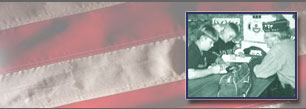Participate in the Project >> Getting Started
Getting Started:
Finding Partners, Locating Resources
- Find a veteran to interview: Everyone knows a war veteran
or someone who served in support of veterans. Start by explaining
your objective to your family, friends, and coworkers. The remaining
veterans of World War I are our most immediate priority. If
you know of any in your community, we urge you to contact them
through their families, friends, or clergy as soon as possible.
You can also contact veterans of all wars through the many veterans
organizations active in your state, such as the American Legion,
Veterans of Foreign Wars (VFW), AMVETS, and Disabled American
Veterans (DAV), as well as other organizations such as the Japanese
American Veterans Association, Jewish War Veterans, Military
Chaplains Association, The Retired Enlisted Association, and
the Women Airforce Pilots of WWII. Work with the volunteer service
arm of your nearby U.S. Department of Veterans Affairs medical
facility, or contact your state department of veterans affairs.
Information about many veterans service organizations and state
veterans affairs offices may be found on the Department
of Veterans Affairs: Partners, Veterans Organizations, and Vendors
Web site.
- Find a civilian to interview: Many civilians worked
in support of the U.S. armed forces during wartime. Some civilians
may feel their accounts are not of interest, but their contributions
to the nation's war efforts are an important part of the story.
These civilians include men and women who worked in war-related
industries, held technical support jobs, or volunteered their
services in numerous ways. Civilian activities varied depending
on the war. Some examples include people employed in the defense
industry building planes or weapons; civilians who worked on
military bases in the United States or overseas; Red Cross workers
and other civilian medical personnel; and home front volunteers
active in civil defense work and health services. These are
just a few examples. You probably know of civilians who contributed
in other meaningful ways.
- Contact one of our Official Partners in your state:
If there is an organization or institution that is an Official
Partner of the Veterans History Project in your state, you can
contact them and volunteer to assist them in the creation of
their oral history project and collection. A list of our Official
Partners is available on our Web site.
- Partner with your local library: Meet with a librarian
and propose that he or she develop a project to create and preserve
within your community a local collection of veterans oral histories
as part of the National Veterans History Collection coordinated
by the Library of Congress and the American Folklife Center.
- Partner with your local high school: Meet with the
school principal, a history or journalism teacher, or a media
instructor to encourage students to become Official Youth Partners
of the Veterans History Project. As such, they will be part
of our Volunteer Corps who will interview veterans and collect
documents for the project. Also, high school and college audiovisual
departments may be willing to loan recording equipment or set
aside space in their recording laboratories for your use.
- Partner with local businesses: A local business may
be willing to provide money to pay for recording tapes, batteries,
photoduplication, and other small expenses that your project
may incur. Video rental stores, camera shops, and electronics
stores may be willing to donate or loan an audio recorder or
video camera. Your public access television station may lend
space, equipment, and technical know-how.
- Visit with your newspaper and radio managers: Not only
can local newspapers and radio stations spread the word about
your project, they may be interested in using the interviews
you assemble for articles and public programming. Local television
and radio stations may also be willing to loan or donate recording
equipment to your project.
- Contact your state arts or humanities councils: State
arts councils and humanities councils may be able to provide
small grants in support of your project. Within many arts councils
are folk arts programs coordinated by a folklorist who can
give
valuable advice and encouragement. The
Folklife Sourcebook: A Directory of Folklife Resources in
the
United States, maintained by the American Folklife
Center, contains a listing of state public folklife programs.
State
humanities councils can identify historians and oral historians
who can advise you on how to conduct interviews and how to
research
military and domestic wartime history.
Participate in the Project >> Getting
Started |



